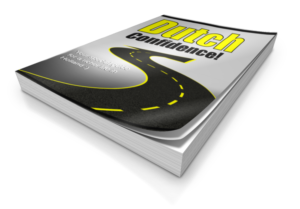Have you noticed that learning and speaking Dutch is not always that easy? If you did, then don’t worry… even if things do feel difficult at times, you can still be on the right track.
One important step to creating a breakthrough is actually quite simple. Just be honest and acknowledge that learning and speaking Dutch can be a challenge. Once you realize which obstacles and difficulties you can encounter, it is already easier to deal with them…. In most cases it will be clear what to do next and then moving forward is easier than ever…
So what are the 10 main challenges? Here you have a first list:
1 Deciding
The first obstacle is a mean one. If you do not decide then chances are high that you will not even start. But… even if you have started, there is one step that most people simply overlook. You have to decide in advance how much Dutch you would like to master. Therefore, think ahead and have a look in your future…. Would you like to lead meetings or give presentations, or would you like to convince certain customers in Dutch? Think of something that really gives you a great feeling of accomplishment!
Many people follow a language course and wonder what could happen next. But.. if you don’t set clear goals for yourself then probably nothing exciting will happen for your Dutch. Another way of saying is this: when goals are low, then learning is slow!
Therefore deciding is a skill by itself. If you do it right, you’ll immediately notice an important difference while learning, already on the first day!
Here is another important thing… deciding is not something that you only do once. You have to reinforce it. It is like a small plant that you water every day. At the same time, certainly if you combine it with a positive mindset, then deciding each and every day again is an enormous force that pushes you forward!
2 Finding Time
If you are like most people, then probably you have to work. You need to pay your bills, right? Unfortunately, in most cases, work takes the biggest part of your day. It consumes a lot of time!
No wonder that many people decide to learn Dutch after work. It seems a great idea, right? Now that you are off at 18.00, you can do anything that you want. There is only one problem: often it does not work 🙁
Learning Dutch after a work is almost never a good idea. When you learn new things, that you need to be mentally alert. But… when you somehow a bit tired then you’ll learn at least 4 times slower. Therefore, learning after work is actually a waste of time!
Also, if you only dedicate only one evening or two evenings, then there will be too many gaps. You try to learn, then you stop, your intention is to do homework, but you don’t and meanwhile you forgot many things that you tried to learn in the first place!
Here is one important thing that only few people understand. If you do not have a lot of time, then the best way to save a lot of time is to learn Dutch a couple of days in a row! It is the fastest way to bring your Dutch to a whole new level! Sure, it might imply that you won’t work for a couple of days, but… your work will continue to exist… you will not die…. on the contrary…. also if you disconnect from your job now and then, then you may notice a very positive impact too… Certainly if you feel that you really accomplished something new, if is easy to get back to work with refreshed energy!
3 Pronunciation
Speaking a new language can be a weird experience, certainly in the beginning… You may have to use different muscles of your mouth or do acrobatic things with your throat, so probably it will feel strange!
Then there are sounds that might not be easy for you to say, such as g, ui and if you are English or Chinese, also the R…. But… when it comes to pronunciation, there is a much bigger trap and most people are not aware of it…
The real risk is that you start to give it too much of your attention. Sure, it is important that you pronounce words correctly for better understanding. But… if you focus too much on it, it causes many frustrations and slow learning! Once again, pronunciation is important but… there are many other important things as well. People that only focus on pronunciation often have a tunnel vision and miss many things.
So here are some tips. First of all, through time your pronunciation will naturally improve. Don’t strive for perfection in the beginning.
Then make it your priority to increase your understanding first. Once you understand more, your pronunciation will improve automatically. Also, if you say things that you don’t (really) understand, then it always has a negative effect on your pronunciation! But… once you start to understand more, and certainly once you see how Dutch spelling shows you exactly how to say the words, speaking words will be easier and easier!
4 Words often have more than one meaning
When most people learn new vocabulary, then they learn a new word and they give it only one meaning. First of all, it is highly inefficient that if you learn one word you can use it in only one context. Wouldn’t it be more convenient if you could use it in let’s say 6 different situations?
If you only attach one meaning to each word that you learn, then of course, you will not be able to understand many things. On top of that, it will dramatically decrease your speaking ability.
Here is one classic example: weer means weather and again → Het is weer mooi weer means it is good weather again.
It is amazing how many people get stuck if they can only think of weather with the word weer. A simple sentence such as: ik drink weer bier is like a huge enigma impossible to solve for so many people if you can only think of weather…. But why not look at it this way: I don’t know whether we will have good weather. Don’t you think that whether and weather are basically one word too?
When you look at to – too – two you’ll probably see them as three different words. But… if you pronounce it you will not hear the difference, right? Therefore the fact that you write it differently could help you to understand the difference between words that sound the same. Therefore it makes spelling more complicated too!
Therefore, be generous when you learn new words in Dutch. Learning the Dutch word is the hardest part anyway, so just give it as many meanings if you can! See extra meaning as a welcome bonus. I like to call it, twee halen één betalen (pay one get two) Once you really understand this principle, you’ll love it!
5 Dealing with pictures
Dutch is a very visual language. Therefore, once you can see pictures, you’ll rapidly boost your vocabulary. On top of that, many expressions will also start to make much more sense.
Let’s take stokbrood for example. Stok = stick & Brood = bread. Sure, you can call it French bread or even baguette, but… just in case that you did not really realize, baguette means stick as well but than in French.
Een stok achter de deur is a stick behind the door, so that someone can hit you if you are not dedicated to your goal. Many Dutch people claim that they need this, because otherwise they would be lazy all day! Of course, een stok achter de deur does not have to be a person that kicks in your butt sometimes, it could also be a negative consequence or a deadline. By the way… if you keep a stokbrood for a couple of days, you could use it as a deadly weapon 🙂
The great thing is that if you know let’s say 1000 words, then expanding your vocabulary is so easy. Picturewise, many words make absolute sense and.. it is not something that you have to memorize. All you need is to see one hundred examples and then, once you know how to think visually you’ll be able to understand many new words and expressions! I love to call it intuitive learning, or discovering while playing 🙂
6 Anacondawords
One obstacle that you have to overcome is that many words look intimidating. They are sooooo long. If you like, you could call them anacondawords. Anacondawords are words that are really look long and often it feels that they could strangle you….
So let’s have a look. Would anacondawords be more difficult for you to understand than anaconda word? It is only a little space right? In Dutch you have the tendency to cram words together. It is logical because then you know that it is one object. For example anacondawoord is a word that looks like an anaconda. But… if you write anaconda woord it is like: we have an anaconda and a word, so now it could also be different things.
But… long words do not have to stop you. Coachingsessie is not more difficult than coaching session, right? Sure… in English there is that preference to write words separately… But… the problem is that English is not always that consistent. Take the word butterfly for example. Why don’t you write butter fly? Then, I see the butterfly and the butter fly are two different things… If you get this example then you’ll have a better understanding for the Dutch system.
One tip: if you see a Dutch anacondaword, take a breath, think of Zen and relax. Just look at the words that you already recognize. Here is one example: winkelopeningstijdendiscussie. You know discussie, right? Tijden is times or hours. Winkel is shop and opening is easy of course. So now you have the word for discussion about opening hours of shops. Don’t worry…. you don’t have to say it. You could also say: discussie over de openingstijden van winkels. But… just admit it…. that one word is a masterpiece of efficiency, don’t you think? Or should I write master piece?
7 Order in the sentence
One big challenge is the order in the sentence! Unfortunately, many Dutch people are not aware of it, so there is little that they can do to talk in an easier way for you. Just for your information, Dutch works more or less like German. Therefore there are clear and strict rules and they can easily be learnt, certainy if you do it step by step in logical ways.
Here are some tips. Often in Dutch, verbs do not stand together. Ik wil bier drinken will not make a lot of sense to you in the beginning, but this is simply how people normally talk.
You’ll also find verbs at the end. It happens when in English you say: I don’t know what time it is. But… before you start to feel sorry for yourself, just have a look at 3 different languages: English, Dutch and Spanish.
* I am intelligent. It is good that I am intelligent
* Ik ben intelligent. Het is goed dat ik intelligent ben
* Soy inteligente. Es bueno que sea inteligente
Can you see what happened in the Spanish sentence? Sure, you did not move the verb to the end of the sentence, but… you have to come with a whole new version of the verb! So what is easier? Move ben to the end of the sentence or change soy into sea? And please, if you are Spanish then try to be objective 🙂
8 The past tense
Compared to other languages, the past in Dutch is pure evil. There are many irregularities. Certainly for simple things that you could also do 10.000 years ago, such as slapen (to sleep), drinken (to drink) and eten (to eat), they all tend to be irregular. Luckily all words from latin languages such as demonstreren , filosoferen and new verbs such as twitteren and internetten are all regular.
Also English has many irregular verbs. You don’t say I buyed, but I bought and you say I came instead of I comed. In general, you could say that most verbs that are irregular in English are also irregular in Dutch. The good news is that in Dutch you have a lot of freedom when you want to uses different tenses, so this is a lot easier compared to English or Spanish.
Here is one important warning. Most people start to learn the past tense too soon! If you do this, then it works like pure poison for your Dutch. Unfortunately, in most methods they already start with past tense in chapter 3 or 4 and once again, if you do it too soon, then you’ll enter a field of quicksand. Here is one powerful tip: make sure that you can talk about anything for now and in the future. Then, when you can express yourself with relative ease, then start to learn the past tense. The great thing is that if you wait, you’ll learn it a lot faster. Within 2 days you can already master most of it!
9 Dutch people speaking English to you
You must have noticed it… every time that you try to speak Dutch, then Dutch people switch over to English, certainly in Amsterdam. Therefore if you want to speak Dutch, you’ll have to insist a lot more! Speaking German is easier in Germany and speaking Spanish is easy in Spain, but somehow it could even feel as if people refuse to speak Dutch with you!
Luckily, there are many things that you can do. The most fun thing is to simply pretend that you don’t understand English (although you should not do it with your boss and colleagues). And there is a lot more… first of all stand firm in a friendly way…. and… be honest… the secret is confidence and being at ease with yourself… Sure… a second of silence might feel a looooong time for you, but it is never an excuse for you to switch over in English.
Once again, really be honest and look if you can see why Dutch people switch over to English. There are some key factors. The great news is that if you are determined and once you have decided that no matter what happens you’ll begin your conversation in Dutch and you’ll end your conversation in Dutch, then somehow keeping the conversation in Dutch will be quite simple.
Here is another important reason why honesty from your part is so important… many people if they like to speak think in chaotic and complex ways. If you know how to keep it simple, then speaking Dutch is a lot easier and you will not feel the urge to switch over to English. Then – even if you believe that what you said is too simple – if you do it again and again you’ll speak with far more confidence and ease.
Once again, although it might be difficult for you to believe… at the end whether Dutch people speak English or Dutch is completely within your control!
10 Be the best friend of yourself!
This last point is certainly not only valid if you like to learn and speak Dutch. But… somehow in the context of learning and speaking Dutch, it is something that many people forget, including professional coaches!
Let’s look at it this way… if you are at a party and everyone speaks Dutch. Then whose problem is it? If you like new job but you need to speak Dutch, then once again, whose problem is it?
Here is a strange thing…. you might believe that you learn Dutch for Dutch people, which to some degree is true. But… if you think about it again, then you’ll have to admit that one person that is going to enjoy positive benefits is you! So here is the strange paradox. Although you may like to join in with Dutch conversations for connecting, socializing, friendship, relations etc, at the end it is also a selfish activity!
Here is another strange thing… you may believe that being selfish is easy, but…. what if the opposite is true? Most people find it difficult to stand for all those things that they really and truly want. If you are like most people, then you tend to do things for other people first, before you do things that could benefit the most important person on this planet, which is you! This is exactly why most people find it difficult to reserve time for things that are important for you!
So of all the challenges this might be the hardest one… Really ask yourself: what do I like and what do I want? If speaking Dutch is one of those things, then make sure that you stand for it!
Also, during this whole process make sure that you are kind and friendly to yourself.. Appreciate yourself, even if you hate your own pronunciation, or if you feel embarrassed that you cannot say even the simplest things. And make sure that you always recognize the progress that you are making, even if you think that there is no progress at all!
Learning and speaking a new language can be a great adventure. It does not only connect you in new ways with other people, it can also help you to connect with yourself! When you learn more, you’ll understand more… you get out of your comfort zone and have new experiences. Life feels richer. You’ll have more fun.
Other challenges
This is a first list of what I see as the most imporant challenges for you if you like to speak Dutch. Is there any challenge that we should add? Then if so, please let me know!
What would be your biggest challenge and… if you could overcome one certain obstacle, then what would be possible then? Please feel free to share!









solar movie
on 14 Oct 2016Mariana
on 01 Feb 2019Albert Both
on 03 Feb 2019The Books That Helped Me Grow In Life
on 22 Jul 2020